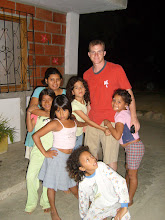

In March, I had the opportunity to participate in a medical mission to the Amazon with a group of doctors, nurses and students from Franciscan University (my alma mater). This trip was one of the highlights of my time here because we really got to see how the people lived.
We first traveled to a small town on the edge of the Amazon basin, followed by an hour bus ride and a three hour hike into the mountains. Once we arrived in the village the people came out to greet us, but were very timid with their new visitors. The majority of the people did not speak Spanish, but Quichuwa, a primitive dialect. Once we set up the clinic for the people, each doctor or nurse needed two translators. One of the men would have to translate for the people into Spanish and another person would have to translate from Spanish into English for the medical staff.
Since I was translating, I got to hear many of the stories of the people. I had to ask some of the people if they had ever had any medical attention before so I asked them if they ever traveled into the city to see a doctor. “Never,” they said. So I asked them if they had ever been to a doctor that had come to their village. “No one has ever come to see us.”
The people were very humble, very simple and very welcoming. All the people are farmers and live off the food they grow, mostly yuca and other vegetables, perhaps eggs if they have a chicken. The men were very present in the community and were directing the people and served us our food. They were all fathers and you could see that the indigenous values of family life were still very much present in the communities. This is not the case in other parts of Ecuador where many of the families are without fathers.
The story that had the most impact on me was when an elderly couple came in to the clinic. As they have no children still at home, they both work in the fields to grow their food. Every day, all day. After seeing them, the nurse gave them some medicine and told them to take it three times a day with food. After they heard this from the translator, they started laughing. I asked them why and the translator told me because they never eat three times a day. What struck me was they were not embarrassed or concerned, they just thought it was really funny that we would tell them to eat three times a day, as if they had that much food to eat. Needless to say, it was an eye-opener.

No comments:
Post a Comment